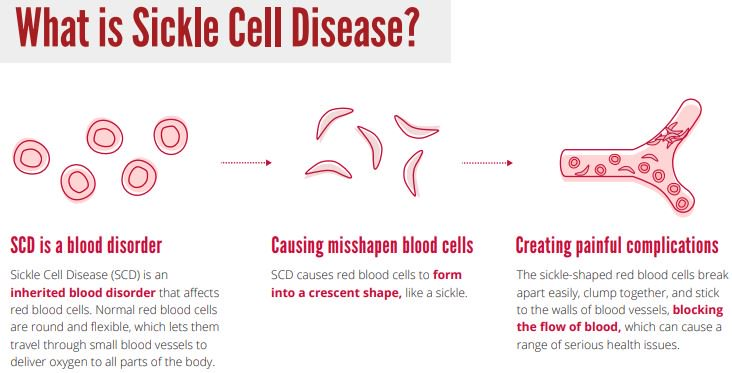Social Justice
World Sickle Cell Disease Day 2021
- 21 Jun 2021
- 4 min read
Why in News
To commemorate the World Sickle Cell Disease (SCD) Day on 19th June, the Ministry of Tribal Affairs (MOTA) flagged off mobile vans under the Unmukt project for strengthening screening and timely management of SCD in tribal districts of Jharkhand and Chhattisgarh.
- The United Nations General Assembly (UNGA) adopted a resolution recognising SCD as a public health problem on 22th December, 2008.
- The UNGA also recognised SCD as one of the first genetic diseases.
Key Points
- Sickle Cell Disease:
- It is an inherited blood disease which is most common among people of African, Arabian and Indian origin.
- It is a group of disorders that affects hemoglobin, the molecule in red blood cells that delivers oxygen to cells throughout the body.
- People with this disease have atypical hemoglobin molecules called hemoglobin S, which can distort red blood cells into a sickle, or crescent shape.
- This blocks blood flow and oxygen from reaching all parts of the body.
- Symptoms:
- It can cause severe pain, referred to as sickle cell crises.
- Over time, people with sickle cell disorders can experience damage to organs including the liver, kidney, lungs, heart and spleen. Death can also result from complications of the disorder.
- Treatment:
- Medication, blood transfusions and rarely a bone-marrow transplant.
- Related Data:
- India alone is home to about 1,50,000 patients with SCD and about 88% of Sickle Cell Anemia (SCA) cases in Asia.
- The disease in India occurs predominantly in eastern Gujarat, Maharashtra, Madhya Pradesh, Chhattisgarh, western Odisha and in pockets of the Nilgiri Hills in north Tamil Nadu and Kerala.
- The disease is prevalent among tribal communities (including children).
- As per MOTA, SCD is affecting more women and children and nearly 20% of tribal children with SCD die before reaching the age of two, and 30% children die before reaching adulthood.
- Challenges:
- Social Stigma and Prevalence among Tribal Population (where access to care for SCD is limited).
- School Drop Out:
- Children with sickle cell disease often have to drop out from school.
- Policy Issue:
- The delayed implementation of the 2018 draft policy on haemoglobinopathies.
- The policy aims to provide evidence-based treatment for patients and reduce the number of new-born children with sickle cell disease through initiatives such as the Sickle Cell Anaemia Control Program, screening and prenatal diagnosis.
- Initiatives by India:
- Initiative by the Ministry of Tribal Affairs:
- SCD Support Corner, a portal to collect real time data and provide relevant information related to Sickle Cell.
- It will help in making a Central Repository of data.
- An ‘Action Research’ project under which Yoga dependent lifestyle is promoted to reduce the complications in the patient suffering from this disease.
- SCD Support Corner, a portal to collect real time data and provide relevant information related to Sickle Cell.
- Expanded Screening:
- Certain states, such as Chhattisgarh and Gujarat, have expanded their screening programmes from hospital to school-based screenings.
- Extrapolating such screening efforts and implementation strategies to other states will help map the prevalence of the disease.
- Disability Certificate:
- The Ministry of Social Justice and empowerment has increased the validity of disability certificates for SCD patients from 1 year to 3 year.
- Initiative by the Ministry of Tribal Affairs:







